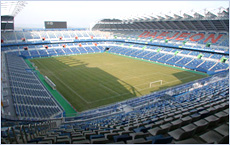 |
|
|
|
|
|
|
|
|
|
 |
 |
 |
| Daejeon Metropolitan City |
 |
|
 |
 |
| Daejeon city |
Sikjangsan (Mt.) |
Stadium |
|
 |
 |
♦ Intoroduction |
|
 |
Daejeon has been a land inhabited by Korean ancestors since the Paleolithic era. It was part of the Cultural Zone of the Baekje Kingdom established in BC 18. Centrally located, it is only half a day's trip from anywhere in Korea.
It is the second largest administrative capital with three offices of the central government in its province. It is the hub of science and technology with over 70 research centers, and the Daejeon EXPO Park. |
 |
Area: 539.83km² Populationa: 1,438,000 (as of 2003) Average Temp. (July): 25.0°C Popular Attractions: The Eight Sights of Daejeon * Special Product: Crafts (metal, wood, paper,ceramics)
* Sikjangsan (Mt.), Bomunsan (Mt.), Gubongsan (Mt.), Jangtaesan (Mt.), Yuseong Spa, EXPO Park, Daecheonghosu (Lake), Gyejoksan (Mt.) |
 |
 |
♦ Daejeon World Cup Stadium |
|
 |
 |
 |
The Deajeon World Cup Stadium is located in the Yuseong Spa Special Tourism Zone, with various relaxation space and accommodation facilities. The Gyeryongsan National Park, Daejeon EXPO Park, Uam Historical Park, the ancient capital of Baekje, Gongju, and Puyo are found nearby. Moreover, it is a football-only arena and the first stadium with a half open roof, with an atmosphere of a pleasant traditional Korean inner courtyard. |
|
 |
Location: 270 Noeun-dong, Yuseong-gu, Daejeon
Capacity: 40,407
Access: 30 min. from Cheongju Int'l Airport (Expressway) 40 min. by bus from Daejeon station |
 |
|
|
|
|
|
 |
| Copyright 2003-2005 East Asian Football Federation. All Rights Reserved. |
 |
|
 |
|
|